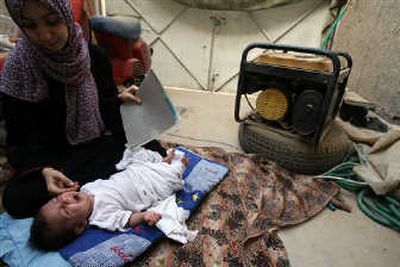More electricity in Iraq, but shortages remain

BAGHDAD – Don’t try to convince Taha Yassin that Iraq’s power shortages are finally easing: His children cry each night when the fan cuts off and the house heats up.
Iraq is producing on average 11 percent more electricity this year than a year ago, officials announced Sunday. Improved security allowed repair crews to finally get the upper hand, fixing damaged lines and stations, some sabotaged by extremists.
But demand continues to exceed the country’s supply, and the distribution network is old and rundown, said British Brig. Carew Wilks, who heads energy operations for U.S.-led coalition forces in Iraq.
“It will take many years and major investment to fully meet the needs of the Iraqi people,” Wilks said at a news conference in the Green Zone.
In Baghdad, despite the improvements, many people still get only three to four hours of city power – and they are bitter.
“It is a tragedy that has turned our life into a nightmare,” said Yassin, a minibus driver whose house in Baghdad’s Baladiyat neighborhood gets four hours of city power a day. U.S. officials say the current average in Baghdad is about 10 hours of power a day and nationwide, nearly 11 hours.
Iraq’s government is likely to earn $70 billion in oil revenues this year, “and yet it cannot solve our problems,” Yassin said.
The shortages force many people to buy power from private generators run by neighbors or small businessmen. Baghdad’s neighborhood streets and alleys often are topped with a tangled ceiling of electrical cables connecting homes to such generators.
Nevertheless, officials stressed Sunday, there has been sharp improvement.
At this point last summer, nine critical power lines nationwide were down and in need of repair because of sabotage, said Wilks. Not a single one is down now, allowing work crews to focus instead on new construction.
The country suffered 11 major nationwide blackouts from last December to this May, but has suffered none in recent weeks, he said.
Overall, Iraq’s electricity production jumped 11 percent in the first six months of 2008 compared to the same period a year ago, Wilks said. Some weeks are even better depending on minor fluctuations – this week, 25 percent more power was generated than during the same week a year ago, he said.
Officials do give priority to critical buildings, said Wilks, making private dwellings a lesser priority.
Big hospitals like al-Kindi and Yarmouk in Baghdad, for example, have special lines from city plants, guaranteeing power most of the day, said Deputy Health Minister Adel Muhsin.
Iraq’s electrical woes have long been a source of discontent among the public.
Improving the grid was a major focus of U.S. Army engineers immediately after the war, but the effort ran into immediate problems. Officials found barely operating power plants, lacking spare parts and suffering from years of neglect brought on by wars and U.N. trade sanctions.
The decline had begun during the 1991 Gulf War, when U.S. warplanes targeted the grid. Damage also occurred during the 2003 invasion and in the looting afterward. Insurgents also quickly began attacking facilities.
As security worsened, more than $1 billion was shifted from power projects to security spending.
The drop in violence – to its lowest level in more than four years – turned the momentum the last six months, Wilks said.
With acute repairs now done, coalition officials will next turn toward helping Iraqi officials distribute power more fairly and in a stable fashion to avoid blackouts, he said.